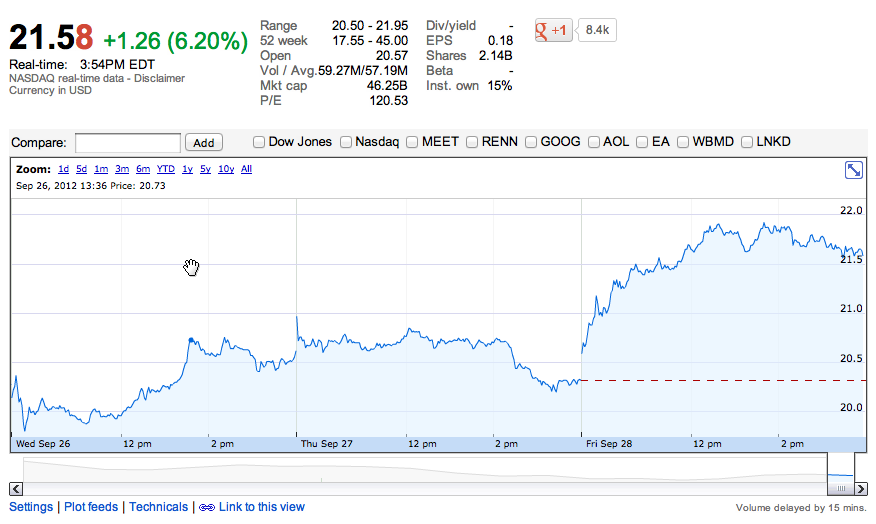Well, Facebook shareholders sure like the sound of Gifts.
Around Wall Street’s close yesterday, the company launched a much anticipated e-commerce initiative that lets Facebook users send real, physical gifts to friends and family on birthdays and special events like engagements and weddings. It gives the company a third business model beyond advertising and payments revenue. Shares have jumped by 6.6 percent today to $21.66.
So what could Gifts mean for Facebook’s bottom line? Let’s do some guesswork. The company has 165.7 million users in the U.S., according to the ads tool. Let’s say between 2 and 6 percent actually convert and pay (which is standard for a Facebook game or app), and each of those consumers buys two gifts a year at roughly $30 each. That’s between $200 million and $600 million in additional revenue. But you’d have to take out whatever the costs of the goods are and Facebook didn’t disclose its revenue share. If they had Amazon’s gross margins, which are between 20 and 25 percent and are probably much higher than Facebook’s, they would have somewhere between $45 million and $140 million in additional gross profit.
Considering that Facebook earned $1 billion in net income on $3.7 billion in revenue last year, this would be a small bump in profit for the company. But don’t forget the holiday quarter, where Christmas and Hanukkah could add a nice seasonal boost to gifting revenues.
The other thing to keep in mind is that Gifts will allow Facebook to collect tens of millions of more credit cards from users, which will lead to other future revenue streams. The company disclosed in its IPO filing that just 15 million users bought its virtual currency Credits last year. Apple, in contrast, has 435 million iTunes accounts, so that company’s database of payments information on customers is at least an order of magnitude larger than Facebook’s.
Before Gifts, Facebook used to accumulate credit card data on its users primarily through games and virtual goods purchases. But games, while extremely popular, aren’t a universal use case on the site. Gifts may help on-board a broader base of consumers onto Facebook’s payments system. And honestly, a 2 to 6 percent conversion may frankly be a little low for the the program especially because it gets such premium billing and promotion in the top right-hand corner of the home page. The more payments data Facebook has on its users, the more seamless it will be for consumers to buckle and buy physical or virtual goods through the Facebook platform.
On top of that, the information that Facebook collects about gifts that people want to give or receive could help with advertising targeting. Facebook launched Gifts after acquiring Karma, a mobile gifting app founded by Lee Linden and Ben Lewis, who previously sold Tapjoy to Offerpal.

